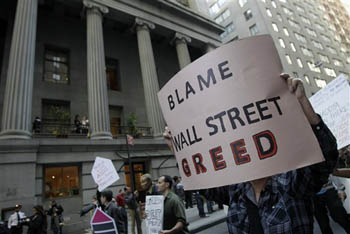

Protesters march down Wall Street to call attention to big bank bailouts and cuts in jobs and education in New York, May 12, 2011. (AP Photo)
 |
Remember 'too big to fail?' Want to see it again?
COMMENTARY | May 147, 2011
Wall Street's sense of entitlement continues. The big banks and brokerages, seeing themselves immune to punishment and abetted by lax regulators, are on the road to another crash, writes Martin Lobel. He proposes this as the new free market rule: Only small businesses have the right to fail.
By Martin Lobel
Lobel@LNLlaw.com
I believe in capitalism the way Churchill believed in democracy: “Democracy is the worst form of government, except for all the others.”
At its best, capitalism encourages entrepreneurship, rapid responses to market forces and greater productivity than any other system. At its worst, it is all too likely to encourage the development of bubbles, oligopolistic or monopoly pricing and excessive concentrations of wealth that – given our political system’s need for campaign contributions – lead to government policies that protect the rich and well-connected from the vicissitudes of the free market. In short, there is always a tension between how a free market should work and the desire for those who control elements of it to protect themselves from competition or gain an economic advantage.
In the four and a half years I worked for Sen. William Proxmire (D–Wis), I routinely met businessmen who believed in and touted the free market but who also just happened to “need” protection from competition or a government subsidy. It was a perfectly rational request from their point of view because in most cases tax subsidies or protection from competition made them more money than they could have gotten by producing something that met consumers’ needs.
Wall Street is the classic example. Bankers and brokers created a non-regulated market in derivatives, hid their liabilities off their books in special-purpose entities and made a fortune. People who questioned whether they were taking on too much risk were squashed. The Federal Reserve Board and the SEC became cheerleaders rather than regulating the market to insure that these transactions didn’t imperil Wall Street. Indeed, the SEC went so far as to prohibit short selling to support Wall Street’s risky behavior even after Alan Greenspan, the chairman of the Federal Reserve Board, warned about “irrational exuberance” in the markets.
Such practices couldn’t continue forever, and didn’t. Market forces punctured the bubble. Because these banks’ and brokerage houses’ risks threatened to take down the global financial structure, government was forced to pour trillions of taxpayer dollars into them to prevent a total economic meltdown.
Were derivatives useful? They sure were for some of the individuals involved, generating huge fees and bonuses and increasing the leverage (and risk) on their investments. Credit Default Swaps (CDS), the riskiest of the derivatives (and the most lucrative), were nothing but naked bets that another derivative like a Collateralized Debt Obligation (CDO) was mispriced. After a while, no one had any idea what these derivatives on the books of the banks and brokerage houses were worth and the credit markets froze. The crash had been long in the making. As Paul Volcker once said, the only thing the banks invented in the past thirty years that benefitted the consumers was the ATM machine.
We have learned from the economic crisis that, if you are big enough and powerful enough, you don’t have to worry about the market punishing you for failure. When Treasury Secretary Henry M. Paulson, Jr., was trying to calm the market by making sure all the big banks had sufficient capital, their executives said they wouldn’t take the taxpayers’ bailout if there were constraints on their salaries and bonuses. They got their way; almost no one was required to disgorge profits. No one went to jail. On Wall Street today nothing has changed. The big brokers deny that taxpayer-funded bailouts saved their companies; they still take multi-million dollar salaries and bonuses with a sense of entitlement.
In a true perversion of Adam Smith’s philosophy, today’s “conservatives” act as though the rich and powerful deserve protection from market forces. For example, cutting tax subsidies, aka tax expenditures, which benefit multinational corporations and other special interests is seen by the Tea Party as raising taxes and therefore unthinkable. It’s a delicious irony: The market is supposed to be perfect, able to run itself – but the rich and powerful need government assistance and protection from it. I propose this as the new market law: Only small businesses have the right to fail.
How do we return to a capitalistic economy in which the free market rewards and punishes business decisions? We won’t as long as the public is kept in the dark about this perverse conservative thought. Politicians will continue to reward their friends and campaign contributors by subsidizing or protecting them from competition. There is a solution to these abuses of power. It lies in the press, and was enunciated long ago when Thomas Jefferson fought for a free press even as he was being abused by members of it. We need the press to expose the hypocrisy of those who claim to be capitalists but are really only using the language of conservatism to pander to the rich and powerful.
If editors and reporter don’t expose what is going on, government will continue the policies that have for the last 30 years shifted massive amounts of income from the middle and lower income groups to the very wealthy. Then, when the next economic crisis comes – as it will – voters will not stand for another cosmetic reconstruction of Wall Street. Voters will demand changes in government regulation and our financial system that may very well eviscerate the benefits of a free market. Cynic that I am, I don’t believe that those on Wall Street will sacrifice short term profits for their long term survival without being forced to do so by an angry public alerted by an informed press.
|
|
Martin Lobel is a partner in Lobel, Novins & Lamont, a Washington, DC, law firm, and chairman of the board of Tax Analysts (www.tax.org), a source for journalists. 
E-mail: Lobel@LNLlaw.com
|
Angry Public/Informed Press
Posted by
Laura Lee
05/148/2011, 11:23 AM
I agree that the only thing that will force our system to change is a huge public outcry, but I am deeply discouraged at the possibility of it happening.
|
Unfortunately
Posted by
Mike Sambrato
05/148/2011, 01:10 PM
The "liberal press" is now controlled by large corporations who themselves are motivated by short term stock valuation. These corps are controlled by very wealthy CEOs, of course, and have a vested interest perpetuating these very same "too big to fail" finance issues you are detailing.
The age of journalistic integrity is over within mass commercialized media. Fox News, for instance, is not a news media company. It is the propaganda arm of this neo-fascist, neo-feudal, self-insulating "conservative" culture of the wealthy elite. The sole mission of Fox News, and Sky Corp in general, is to shape the opinion of the masses so that the backlash against these destructive societal behaviors is mitigated. The "information" that is disseminated through this so-called media outlet is purposefully dishonest.
I applaud your call to arms, Mr Lobel, but your message is likely to fall on deaf ears. The profit motive is too profound to be overcome by any kind of moral ideal. Even the self-proclaimed centrist and liberal news media outlets often practice false equivalency and give voice to dishonest talking points created by conservative think tanks. It is as they say "a racket".
Those that strive to further the goals of the common good are increasingly at a disadvantage as this monsterous conglomeration of wealth continues to cannabalize the US and global markets.
Will strong leadership save us? Will those still clinging to their altruistic ideals steele themselves against this rising tide of financial self absorption? Will the common conservative foot soldier begin to develop of a distase for injurious practices and fade from the ideological battlefield?
One can only hope.
The major villians in this ideological war must be finally and once and for all discredited. We know who they are. They are the cadre of henchmen in charge of the disinformation campaign.
The question is... How do you get a paradigm shift? How do you get all news oganizations not named Fox News to turn on Fox and call out the emporer for having no clothes? An emotional appeal to the collective integrity of the news media industry?
Make Fox a punchline? Hmm...
To many they already are, but its not enough. People need to feel the distaste of what their goals actually are. We of the more sensible ilk have yet to be able to accomplish that goal.
Will medicare be their waterloo? Perhaps - but only if your call to arms reaches the right hearts.
|
Step 1
Posted by
themediacircus
05/149/2011, 09:56 PM
The first step is to remove the influence of outside money from law-making. When a business gives money to influence the decisions made by the people who enforce and interpret the law (the legal & judicial system), that's called bribery. But when they use their money to influence the people who write our laws, it's called a campaign contribution. When we start calling it bribery and acting like it's bribery, then we'll see some real change in this county.
|
I meant country.
Posted by
themediacircus
05/149/2011, 09:59 PM
autocorrect #fail
|
Posted by
Citizen
06/163/2012, 04:34 PM
This commentary was posted 13 months ago. So what has the media said when you asked them why they are playing dumb to the rape of America.
|
|
|
|
|





